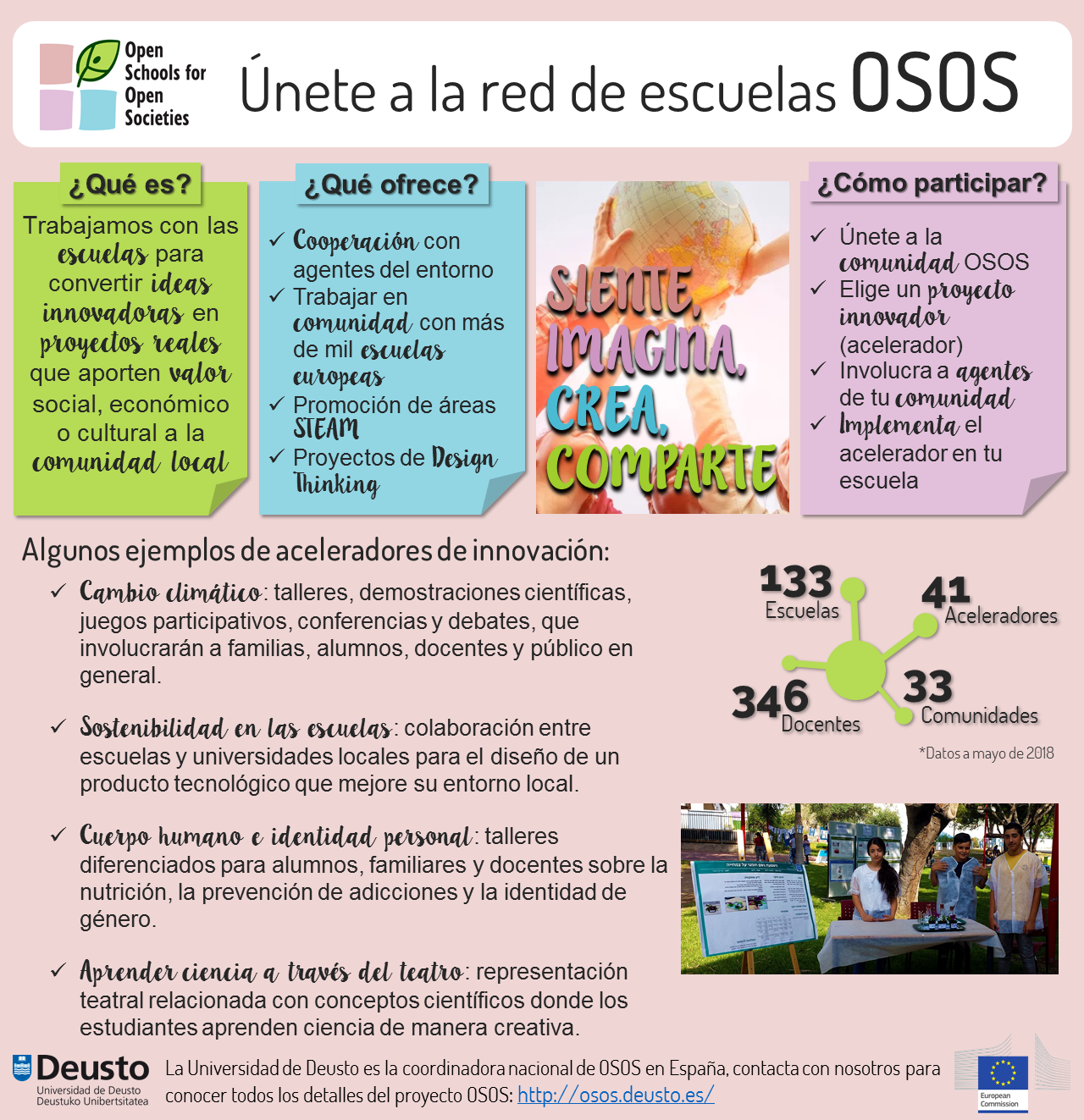
Si estás interesado en participar o conocer más información sobre el proyecto OSOS, ponte en contacto con nosotros: learninglab@deusto.es

Si estás interesado en participar o conocer más información sobre el proyecto OSOS, ponte en contacto con nosotros: learninglab@deusto.es
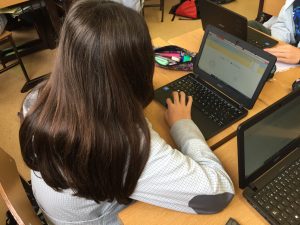
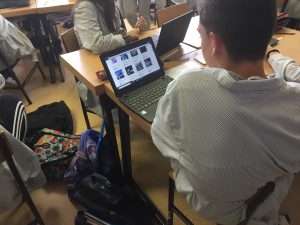
Karmengo Ama School students have been playing and learning with the resources developed in the STEAM Decks project.
The most important feature of the platform for the students has been to be able to choose who to play against, to be able to follow other classmates in the social part of the platform and specially to be able to create their own decks. The students gave very interesting ideas on new topics to create decks on the platform. Soon some of these ideas will be available on the STEAM Decks platform.

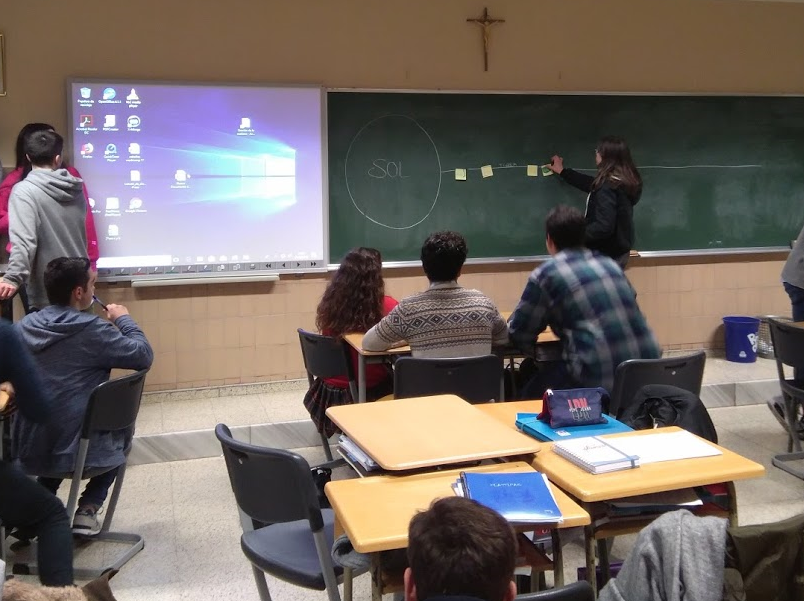
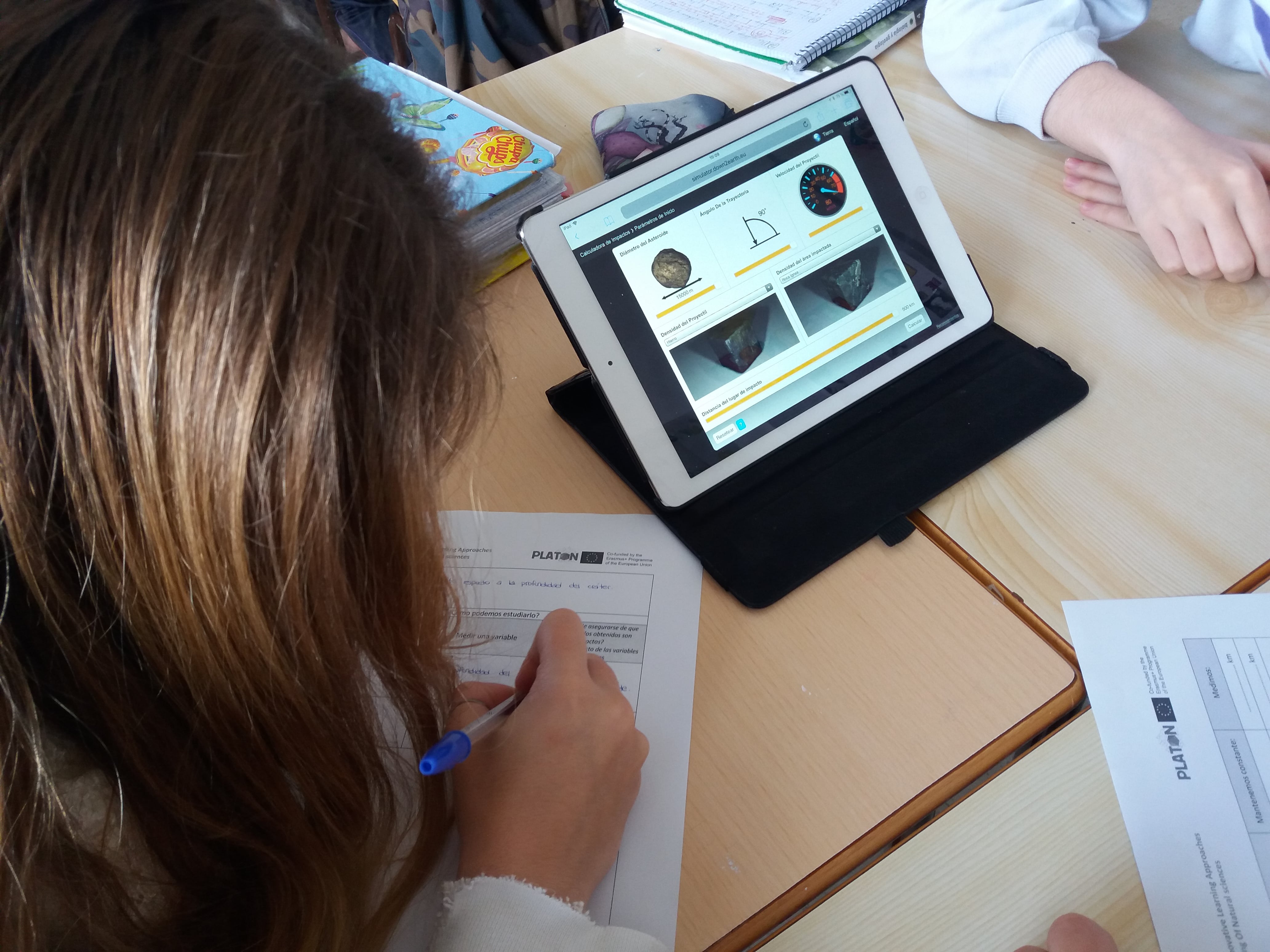

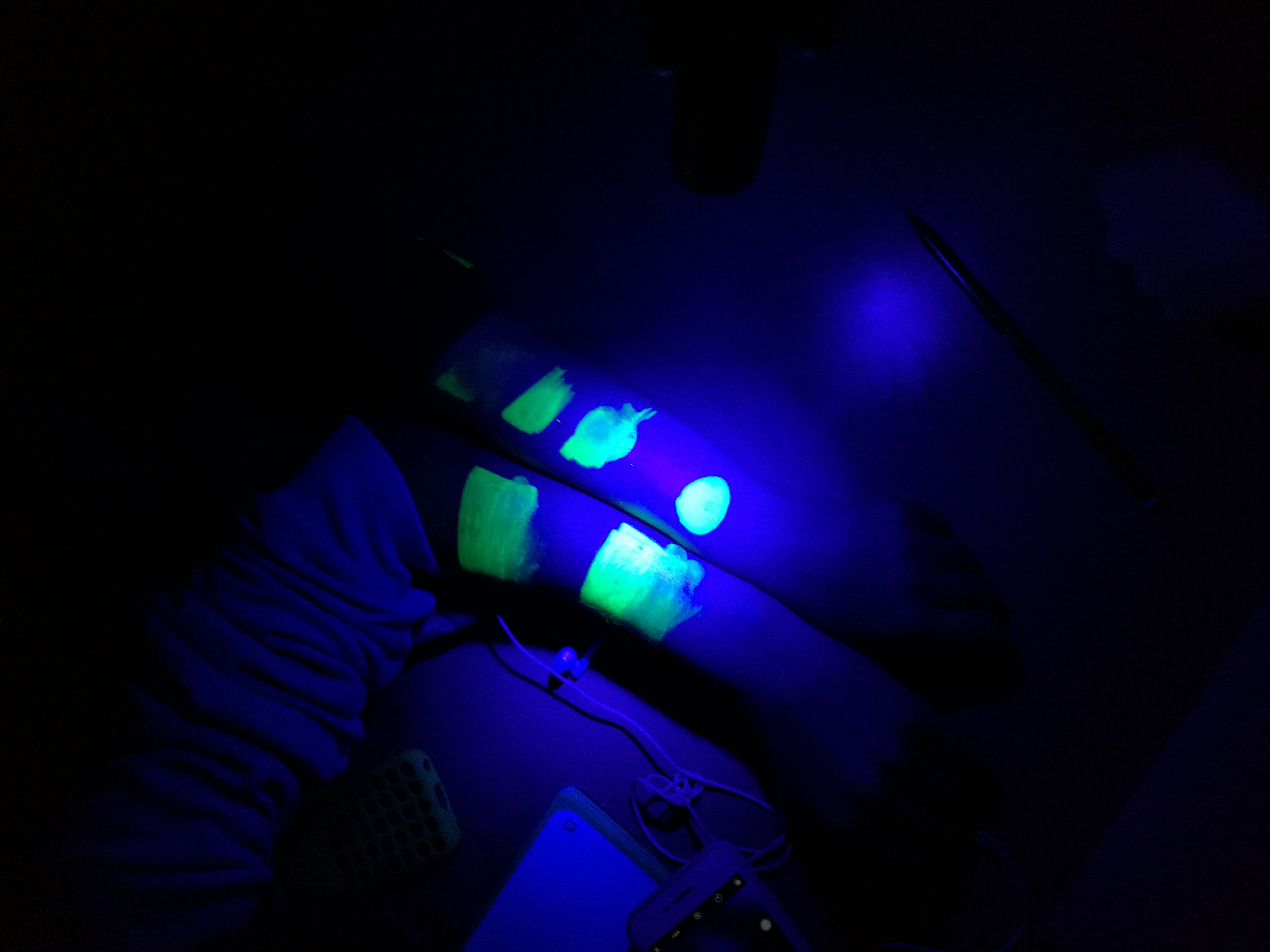
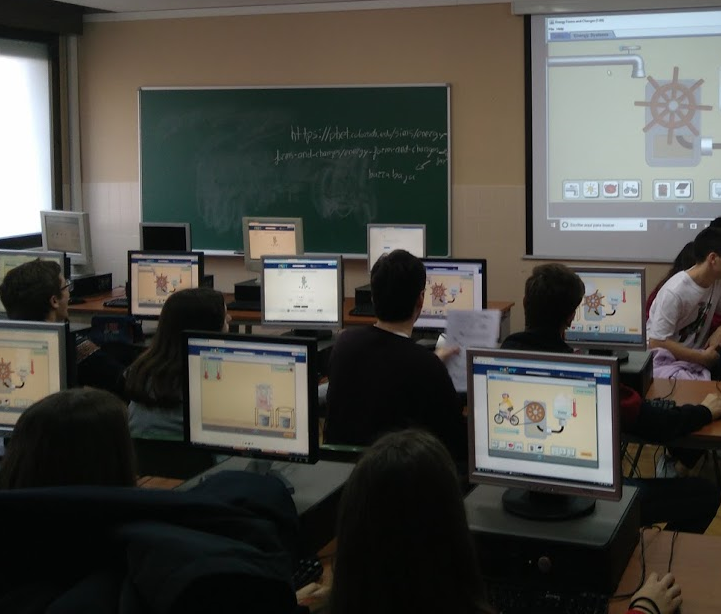
Five schools in Spain have already implemented different PLATON interdisciplinary inquiry-based activities.
The Sagrado Corazón school in Salamanca, has carried out PLATON’s activities and methodology in the subjects of biology and geology, physics and chemistry and computer science, a complete interdisciplinary approach. They have implemented the activity on the extinction of dinosaurs in the fourth year of secondary education.
In the Montes Orientales school in Granada have carried out two PLATON activities. They have carried out the activity of photosynthesis with students of the first year of secondary education and the activity of nanotechnology in the first year of high school. You can see their fantastic work through the following padlet: https://padlet.com/biologiamencia/hi0yz5o8zzjc
The Colegio Maristes Champagnat in Badalona has developed the EMR and health activity in the subjects of biology and geology, and technology with students of the first year of secondary education, within the unity of the atmosphere.
In the Corazón de María school in Gijon, PLATON’s activities and methodology have been based on the subject of scientific culture in high school. You can see in the following padlet the three activities that have worked: https://padlet.com/rafaelmonterobr/x88ymtpcsj7h
The Nuestra Señora del Carmen school in Portugalete have integrated the activity of exponentials in astronomy into the subjects of mathematics and biology and geology with students of fourth year of secondary education.
All of them has shared their experience with PLATON team, and some of the feedback that we have received from them is that they have noticed how their students have learned and corrected misconceptions with the PLATON activities, and they emphasize the interdisciplinary approach of the activities. On another note, the students have told that activities are entertaining and different to the practices they are used to do, and that they have learnt things they didn’t know and didn’t expect.
Thank you very much to all the schools, teachers and students that have get involved in PLATON project, we hope you continue developing the PLATON methodology in your schools.
If you are an interested teacher, school or student don’t hesitate to contact us, we will be very pleased to support you.
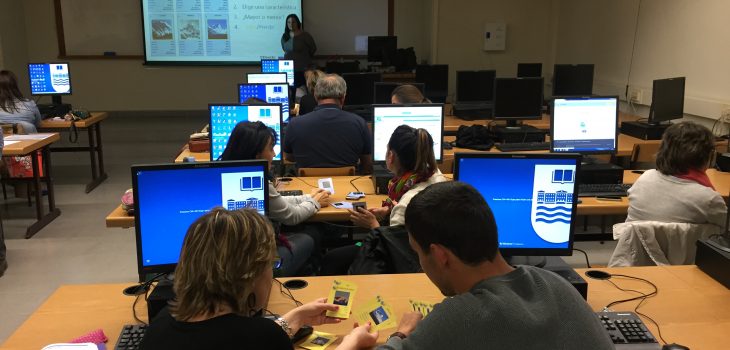
During the months of March and April, several meetings of professors were held at the University of Deusto to present the STEAM Decks project.
STEAM Decks is a European Project coordinated by the LearningLab team of the University of Deusto and with the collaboration of Fatima Educational Foundation, Bertha von Suttner Gymnasium, Scoala Ferdinand I, and Duchess France.
STEAM Decks provides a free access online platform where primary and secondary school students are able to develop declarative knowledge in a contextualized and meaningful way through a multiplayer and online card game.
During the presentation sessions of the tool the teachers were able to work with the online version of the platform and with the printed decks. Both modes of play, as well as the possibilities offered by the mobile app, have proved to be very interesting resources for teachers. The most valued feature of the application is that anyone can design their deck of cards and make those contents so difficult to memorize in their subject, work in a fun way.
@ Copyright 2019 Deusto LearningLab
Reference: 2020-1-ES01-KA226-SCH-096060
Funded by: Erasmus+ KA2
From: 1-03-2020 to: 30-02-2022
Coordinator: UNIVERSIDAD DE DEUSTO (Spain)
Reference: 2020-1-ES01-KA201-
Funded by: Erasmus+ KA2
From: 30-12-2020 to: 30-12-2022
Coordinator: UNIVERSIDAD DE DEUSTO (Spain)
Participants:
Reference: 2020-1-PT01-KA201-078733
Funded by: KA201 – Strategic Partnerships for school education
From: 01-09-2020 to: 30-08-2023
Coordinator: NUCLIO NUCLEO INTERACTIVO DE ASTRONOMIA ASSOCIACAO (Portugal)
Participants:
URL: https://assess.nuclio.org/about/
Description: ASSESS is a project that targets several questions about assessment with the goal of creating a powerful assessment framework for teachers and students. The project will offer teachers a toolkit of digital and analogue tools to assess students in an innovative way and a digital app that aggregates these tools. Teachers will also find an online course that will teach them not only how to use the ASSESS tools, but also how to design and create their own innovative assessment tools.
Reference: No. 871794
Funded by: European Union´s Horizon 2020 Framework Programme
From: 01-09-2019 to: 31-08-2022
Coordinator: ELLINOGERMANIKI AGOGI SCHOLI PANAGEA SAVVA (Greece)
Participants:
URL: https://www.schoolsaslivinglabs.eu/
Description: The Schools As Living Labs project proposes a new framework based on open innovation methods for schools across Europe to approach their science education programs in a new light. Our objective is to make STEM teaching more relevant, systemic, and inclusive and to do that for all of our students. SALL adopts the concept of open schooling in science education where schools, become agents of community well-being by creating new partnerships with other local actors and addressing local issues relevant to them.
Reference: 2015‐1‐ES01‐KA201‐016090
Title: Open Discovert of STEM Laboratories
Funded By: Erasmus+ Programme of the European Union
From 2015-11-01 to 2018-04-30
Coordinator: FUNDACION DEUSTO (Spain)
Participants:
Website: https://odl.deusto.es
Description:
ODL-Open Discovery of STEM Laboratories is initiated to equip European school teachers with innovative approach – micro-MOOC, to deploy STEM laboratories and their application in the everyday teaching practices and, thus, strengthen the profile of the teaching professions. The project will foster partnerships between universities, research centers, training and professional associations, and school sector to modernize the school education by enhancing digital integration in learning and teaching processes with direct access to top-notch facilities of remote and virtual experiments. The program will be based on the requirements of STEM/ICT competence of school curricula in consortium countries and will employ the MOOC methodology, EU best practices in field, libraries of STEM laboratories, and OERs.
ODL aims to:
ODL will expand the methodology and resources for enhancing teacher proficiency and student competence required by modern society. The results will affect educational and economic transformation of partner countries, in particular, and of Europe, in general.
Reference: 561728-EPP-1-2015-1-ES-EPPKA2-CBHE-JP
Title: University-enterprises cooperation in game industry in Ukraine
Funded By: Erasmus+ Programme of the European Union
From 2015-10-15 to 2018-10-14
Coordinator: UNIVERSIDAD DE LA IGLESIA DE DEUSTO (Spain)
Participants:
Website: https://gamehub-cbhe.deusto.es
Description:
The wider objective of the GameHub, University-enterprises cooperation in game industry in Ukraine is to ensure employability and self-sustainability of Higher Education Institution (HEI) graduates, unemployed engineers as well as veterans of Anti-Terror Operation (ATO) in Ukraine by equipping them with knowledge and skills demanded by digital game industry (GI) – a highly networked global impact economy. GI strongly based on online work approach allows one to develop a highly technological field and, therefore, gross domestic product without large investments.
The specific objectives of the project are:
Reference: 2019-1-ES01-KA201-064261
Funded by: Erasmus+ Strategic Partnership KA226
From: 1-06-2021 to: 31-05-2023
Coordinator: UNIVERSITY OF TARTU (Spain)
Participants:
URL: http://digi-science.ea.gr/
Description: Digi-Science addresses the challenges of the COVID-19 pandemic by preparing teachers to deliver effective science education courses to their students, within online/distance and blended settings, mainly through online experimentation and the use of virtual and remote science labs integrated within a concrete educational framework that is designed to foster the development of students’ skills while addressing equity, diversity and inclusion challenges.
Reference: 2019-1-FI01-KA201-060780
Funded by: KA201 – Strategic Partnerships for school education
From: 01-09-2019 to: 31-08-2022
Coordinator: TURUN YLIOPISTO (Finland)
Participants:
Description: POLAR STAR aims to bring together state-of-the-art learning pedagogies and combine them with exciting activities that focus on contemporary science, thus helping teachers to introduce STEAM successfully in their class. At the same time, the project focuses on the development of students’ key skills and competencies as well as deepening their knowledge of fundamental scientific principles, increasing their appreciation of science and technology and their role in today’s’ societies.
Reference: 2019-1-ES01-KA201-064261
Funded by: Erasmus+ Strategic Partnership KA201
From: 1-10-2019 to 30-09-2021
Coordinator: University of Deusto (Spain)
Participants:
URL: http://insteam.deusto.es
Description: The InSTEAM project aims to create a series of learning resources that allow for more
individualized, inclusive and personalized STEAM (Science, Technology, Engineering, Arts and
Mathematics) learning. The goal is to establish pathways for inclusive, innovative and
interdisciplinary environmental STEAM education that reduces disparities in access to and
engagement with digital STEAM education.
Title: Sintetizando – Proyecto Talenki
Organizer: Suspergintza – Ede Fundazioa
Description:
Reference: 688995
Funded by: EUROPEAN COMMISSION
From: 01-06-2016 to 30-11-2019
Coordinator: Fundación Deusto
Participants: FUNDACION DEUSTO FDEUSTO Spain
ZABALA INNOVATION CONSULTING, S.A. ZABALA Spain
AYUNTAMIENTO DE ZAMUDIO ZAMUDIO Spain
ASOCIACION CLUSTER DE INDUSTRIAS DE MEDIO AMBIENTE DE EUSKADI ACLIMA Spain
GREEN TECHNOLOGIES MELETES KAI ERGA GIA TO PERIVALLON ETAIRIA
PERIORISMENIS EYTHINIS GREENTECH Greece
ENBIO EPE ENBIO Greece
NATIONAL TECHNICAL UNIVERSITY OF ATHENS – NTUA NTUA Greece
PANEPISTIMIO PATRON UPATRAS Greece
DIMOS CHALANDRIOU HALANDRI Greece
SERIOUS GAMES INTERACTIVE APS SGI Denmark
ARS AMBIENTE SRL ARS Italy
COMUNE DI SEVESO SEVESO Italy
LEGAMBIENTE LOMBARDIA ONLUS LEGAMBIENTE Italy
SOFTLINE SRL SOFTLINE Italy
MOBA MOBILE AUTOMATION AG MOBA Germany
EMAC EMPRESA MUNICIPAL DE AMBIENTEDE CASCAIS EM SA EMAC Portugal
AGENCIA DE ECOLOGIA URBANA DE BARCELONA CONSORCIO BCN Spain
ENGINEERING – INGEGNERIA INFORMATICA SPA ENG Italy
VIRTUALWARE 2007 SA VWG Spain
Description:
Reference: 2018-1-LT01-KA201-047065
Funded by: Erasmus+ Strategic Partnership KA201
From: 10-09-2018 to 9-9-2020
Coordinator: UGDYMO PLETOTES CENTRAS (Lituania)
Participants: EUN-European Schoolnet (Belgium), Universite du Mans (France), Univeristy of Cyprus (Cyprus), University of Deusto (Spain)
Description:
Reference: 586098-EPP-1-2017-1-UA-EPPKA2-CBHE-JP
Title: Modernization of Pedagogical Higher Education by Innovative
Funded By: Erasmus+ Capacity Building in higher education
From 2017-10-15 to 2020-10-14
Coordinator: PRECARPATHIAN NATIONAL UNIVERSITY (Ukraine)
Participants:
Description:
MoPED aims at modernizing curricula for Pedagogical Schools of Ukraine (UA) by incorporating novel courses of modern ICT teaching tools and inquiry methods. By answering the contemporary challenges and requirements and supporting ambitious large-scale educational reforms in Ukraine, the project will impact quality of pedagogical higher education and enhance digital and didactic competences of future school teachers.
Specific objectives of the project are:
• Created and accredited18 new courses
• Trained 450 lecturers/academic staff of Ukrainian Teacher Training Institutions
• Settled “Innovative classroom” in each UA HEI as a 21Century learning space based on best European practices
• Established effective cooperation between EU and Ukrainian Pedagogic HEIs, school teachers, and their associations strengthening internationalization, knowledge transfer, and academic capacity
Reference: 2016-1-ES01-KA201-024965
Title: Learning STEAM through a playful online platform, social learning and content co-creation
Funded By: Erasmus+ Programme of the European Union
From 2016-09-01 to 2018-08-31
Coordinator: UNIVERSIDAD DE LA IGLESIA DE DEUSTO (Spain)
Participants:
Website: STEAM Decks
Description:
STEAM Decks-Learning STEAM through a playful online platform, social learning and content co-creation provides a free access online platform where primary and secondary school students will be able to develop declarative knowledge in a contextualized and meaningful way through a multiplayer and online card game. To accomplish it, several objectives have to be addressed:
Reference: FCT-15-10615
Title: Inspire young girls in Science and Technology
Funded By: Spanish Foundation for Science and Technology, Ministry of Economy and Competitiveness
From 2016-09-01, ongoing project
Coordinator: UNIVERSIDAD DE LA IGLESIA DE DEUSTO (Spain)
Participants:
Website: inspirasteam.net
Description:
The project INSPIRA “Inspire young girls in Science and Technology” aims to raise awareness of young people, boys and girls, about the reality of women in the scientific-technological field, especially support girls who have an interest or concern about these areas, and thereby increase the scientific and technological vocations among young people between 10 and 14 yr. For the development of INSPIRA, the University of Deusto and Elhuyar Fundazioa have formed a strong multidisciplinary team of professionals to integrate expertise and resources, and create a network of stakeholders involved in promoting female professionals in STEM areas. The methodological and innovative strategy proposed by the project is to organize awareness sessions around “Gender, Science and Technology” for groups of boys and girls in primary and secondary education. On the other hand, a group of female professionals will carry out mentoring dynamics with small groups of girls with interest in Research, Science and Technology.
Reference: 2016-1-HU01-KA202-022916
Title: Vocational Online CollAboration for Learning
Funded By: Erasmus+ Programme of the European Union
From 2016-11-01 to 2018-10-31
Coordinator: BUDAPESTI MUSZAKI ES GAZDASAGTUDOMANYI EGYETEM (Hungary)
Participants:
Website: vocalerasmus.eu
Description:
The VOCAL – Vocational Online CollAboration for Learning project aims to support vocational education and training in Europe through providing training opportunity for HE and VET teachers to experience and to develop skills in online collaborative learning.
Education organizations need to network and collaborate in order to meet the challenges of the diversification of learners, the opening up of education, and the preparedness to merge international and intercultural learner groups and to provide learning services for work-based learners. (C)VET and higher education institutions should be digitally competent in order to meet these challenges and provide quality learning services, with the special focus on digitally and pedagogically competent teachers and trainers.
Reference: 2016-1-ES01-KA203-025327
Title: Platform Integration of Laboratories based on the Architecture of visiR
Funded By: Erasmus+ Programme of the European Union
From 2016-09-01 to 2019-08-31
Coordinator: UNIVERSIDAD NACIONAL DE EDUCACION A DISTANCIA (Spain)
Participants:
Description:
PILAR project proposes a solution that aims to interconnect all VISIR systems, with each other in order to create a grid laboratory shared and accessed by all the participants, expanding and empowering existing systems to a new level of service and capacity. This will allow expanding the application range: each university may install certain circuits on its own VISIR and utilize another type of circuits installed on a VISIR of other universities and viceversa. The project will then provide: 1. A web-based federation of VISIR laboratories and includes a free-access repository for sharing learning resources. Members of this cloud will be the VISIR community partners. 2. The VISIR federation will offer a number of remote labs in the form of services to teachers and students at schools and universities.3. A teacher may reserve any workbench within the clPrintoud for a particular time period. 4. It would also be possible for organization without VISIR to participate. However, they should be granted access to a particular workbench through prior negotiation with the providers.
Reference: 2016-1- PT01-KA201- 022881
Title: Promoting Innovative Learning Approaches for the Teaching of Natural Sciences
Funded By: Erasmus+ Programme of the European Union
From 2016-09-01 to 2018-08-31
Coordinator: NUCLIO NUCLEO INTERACTIVO DE ASTRONOMIA ASSOCIACAO (Portugal)
Participants:
Website: platon-project.eu
Description:
PLATON-Promoting innovative Learning Approaches for the Teaching Of Natural sciences aims to address the lack of relevance between what is taught in school and everyday life, by motivating teachers to update their teaching practices and bring inspiration into their science classroom, increase students’ interest in science and focus on developing students’ basic skills in math and science as well as 21st century key skills, like critical and creative thinking.
The PLATON project approaches science learning not as a decontextualized activities focused on the memorization of factual knowledge organized in a linear progression but as an approach that allows the generation of knowledge through a creative, constructive process that builds upon students’ prior understanding and evolves beyond what is explicitly taught. To this end, PLATON will build a methodology that combines the Inquiry Based Science Teaching Approach with the ‘Big Ideas of Science’ scheme for introducing interdisciplinary learning. This combination can produce a powerful blended approach that can enable teachers to build bridges between the science classroom and the world around us, rethink the way they perceive the science curriculum and take advantage of opportunities to introduce hands-on and minds-on activities for their students.
Reference: 561735-EPP-1-2015-1-PT-EPPKA2-CBHE-JP
Title: Educational Modules for Electric and Electronic Circuits Theory and Practice following an Enquiry-based Teaching and Learning Methodology supported by Visir+
Funded By: Erasmus+ Programme of the European Union
From 2015-10-15 to 2018-04-14
Coordinator: INSTITUTO POLITECNICO DO PORTO (Portugal)
Participants:
Website: www2.isep.ipp.pt/visir/
Description:
“Educational Modules for Electric and Electronic Circuits Theory and Practice following an Enquiry-based Teaching and Learning Methodology supported by Visir+” project targets the broad area of Electrical and Electronics Engineering, and, within it, the subject of circuit theory and practice. It aims to define, develop and evaluate a set of educational modules comprising hands-on, virtual, and remote experiments, the later supported by a remote lab named Virtual Instruments Systems In Reality (VISIR). The nature of each experiment (hands-on, virtual, real-remote) has an impact on the students’ perception of circuits’ behaviour, being therefore mandatory to understand how these different learning objects can be arranged together in order to scaffold their understanding and increase their laboratory-based skills. This is the concern of the underpinning teaching and learning methodology, favouring in particular the students’ autonomy for discovering how circuits work, through an enquiry-based approach.
There has been an increased interest in science and engineering education due to: (1) the shortage of professionals required in scientific and technical areas; (2) the considerable low ratio of students opting for science- and engineering-related degrees, when entering higher education; and (3) the number of dropouts exhibited in the initial years of undergraduate studies. All stakeholders have devoted a great deal of attention and concern to this problem, considering the high number of reports published about and initiatives taken in recent years. In sum, the solutions have been dealing with: raising the society awareness for such a problem (1); increasing the interest for STEM among youngsters (1 and 2); and, promoting new teaching and learning methodologies, especially student-centred ones involving the use of ICT-tools, for coping with a new generation of digital natives (3).
VISIR+ brings together the power of the best remote lab for experiments with electrical and electronics circuits and the long history of collaboration among the consortium partners from Argentina, Austria, Brazil, Portugal Spain, and Sweden
Reference: 741572
Title: Open Schools for Open Societies
Funded By: European Union’s Horizon 2020 research and innovation programme
From 2017-04-01 to 2020-03-31
Coordinator: ELLINOGERMANIKI AGOGI SCHOLI PANAGEA SAVVA AE (Greece)
Participants:
Website: openschools.eu
Description:
Our schools should be incubators of exploration and invention. They should be accelerators of innovation. They should promote Open Schooling. School leaders should set a vision for creating learning experiences that provide the right tools and supports for all learners to thrive. Teachers should be collaborators in learning, seeking new knowledge and constantly acquiring new skills alongside their students. A holistic approach to innovation is needed.
OSOS project will create a core network of 100 Open Schooling Hubs in 12 countries. Each one of these schools will develop a network of at least 9 additional schools to form a national network of schools where the Open School Culture is introduced. Overall more than 1,000 schools will be involved in the project in two implementation phases (school year 2018-2019, and school year 2019-2020.
Reference: 731685
Title: Next Generation Stakeholders and Next Level Ecosystem for Collaborative Science Education with Online Labs
Funded By: European Union’s Horizon 2020 research and innovation programme
From 2017-01-01 to 2019-12-31
Coordinator: UNIVERSITEIT TWENTE (Netherlands)
Participants:
Website: project.golabz.eu
Description:
Next-Lab (Next Generation Stakeholders and Next Level Ecosystem for Collaborative Science Education with Online Labs) is a European research project co-funded by the European Commission in the framework of the Horizon 2020 Programme. Next-Lab focuses on introducing inquiry-based science education (IBSE) in schools and continues the mission of the project Go-Lab, promoting innovative and interactive teaching methods in primary and secondary schools.
Next-Lab provides a varied portfolio of advanced online learning tools in science topics, which contains hundreds of virtual and remote science laboratories, inquiry learning applications and Inquiry Learning Spaces. Furthermore, there is an authoring tool for teachers they can use to create own cross-curriculum learning scenarios and share them with their students.
Using Next‐Lab, students benefit from the rich, challenging learning experiences, shaping their science and technology knowledge together with social competencies. The innovative tools of Next-Lab guide students though the research process, helping them to acquire in-depth understanding of scientific topics as well as 21st century collaboration and reflection skills.
Reference: 2017-1-PT01-KA201-035919
Title: Islands Diversity for Science Education
Funded By: Erasmus+ Strategic Partnership
From 2017-11-01 to 2020-04-30
Coordinator: NUCLIO NUCLEO INTERACTIVO DE ASTRONOMIA ASSOCIACAO (Portugal)
Participants:
Website: idiverse.eu
Description:
IDiverSE is an innovative project that builds up on a previous Erasmus+ project (PLATON) where members of this team also collaborate together. It uses previously created and validated as well as new innovative methods for Inquiry Based Science Learning activities.
Interdisciplinary and collaborative inquiry, local culture, ethnoscience and personal geography will be integrated to create a Science Trail where students will explore their natural environment starting from the Water, continuing to the Land and ending with the Skies. Altogether the results will provide students with a holistic view of the factors that influence their lives, as their culture, their environment and their geographical conditions. Working in cooperation with schools from different islands in Europe and worldwide, through an online platform, students will also realise that each island has a different network of influences creating a diversity that brings value and uniqueness to each student’s homeland.
The project foresees the involvement of at least 20 Portuguese schools, 10 Spanish schools and 10 Greek schools, divided across Madeira, Azores, Canary, Balearic islands, and distributed over several other Greek islands as part of the Rural Wings network. The project is estimated to directly reach at least 120 teachers and 1000 students living on the islands.
Title: Kodetu
Funded By: Internal
From 2015-01-01, ongoing project
Coordinator: UNIVERSIDAD DE LA IGLESIA DE DEUSTO (Spain)
Website: kodetu.org
Description:
Kodetu is a basic computational thinking learning tool based on blockly, used by Deusto LearningLab for working in Trastea and other diverse sessions with school children.
Reference: 8855
Funded By: Fundación Española para la Ciencia y la Tecnología-FECYT. Ministerio de Economía y Competitividad
From 2014-09-01 to 2015-12-31
Coordinator: UNIVERSIDAD DE LA IGLESIA DE DEUSTO (Spain)
Participants:
Description:
El proyecto Ciencia Remota: un nuevo formato para los museos tiene por objetivo principal dar a conocer a los museos de la ciencia y a su público objetivo una tecnología innovadora: la experimentación remota. Dicha tecnología ofrece a los museos un nuevo formato de experimentación y difusión de la ciencia y la tecnología. El museo asociado al proyecto son los Museos Científicos Coruñeses (mc2) y más concretamente la Domus. La experimentación remota es una tecnología compleja que aúna computación, electrónica, sensórica, telecomunicaciones y pedagogía. El proyecto Ciencia Remota se articula alrededor de dos implementaciones: un experimento remoto diseñado en colaboración con la Domus de La Coruña, basado en la mosca del vinagre y su modificación genética, y un juego remoto, Rommie, basado en un robot controlable remotamente.
Title: Cine Accesible
Year: 2007
Coordinator: UNIVERSIDAD DE DEUSTO (Spain)
Participants:
Website: cineaccesible.com
Description:
ACCEplay is a R&D project that has developed the first low-cost hardware-software integrated device to provide unattended audiovisual accessibility in repetitive audiovisual events. The device has been already commercialized and introduced in a set of ten Spanish cinemas. It is installed in the cabin and synchronizes automatically the film that is being shown with audio description for the visually impaired and subtitles for hearing impaired people. Content is adjusted to the tenth of second and it adapts to complex situations like the loss of frames due to film errors, changes in projection speed, or even projection cuts.
The system is compatible with any projection system: 35mm, digital, DVD or blu-ray.
ACCEplay has been developed in collaboration with the commercializing company Navarra de Cine; it is being exploited, in a national expansion process and international prospection.
Reference: 510586-LPP-1-2010-1-SI-LEONARDO-LNW
Title: E-Learning and Practical Training of Mechatronics and Alternative Technologies in Industrial Community
Funded By: Leonardo da Vinci, Thematic network
From 2010-11-01 to 2012-10-31
Coordinator: UNIVERSITY OF MARIBOR, FERI (Slovenia)
Participants:
Website: e-pragmatic.eu
Description:
E-Pragmatic network connects educational institutions, chambers of commerce and small business, enterprises and the associations of enterprises from seven European countries. The main network’s aim is to modernize mechatronics and engineering vocational training of the employed professionals, apprentices and trainees, by enhancing of the existing or establishing new in-company training approaches in the industry.
Mechatronics, as a combination of mechanical engineering, electronic engineering, and software engineering, is still a relatively new engineering field. However most of the engineering professionals are at some point in their career faced with the problems that are by their nature the interdisciplinary, mechatronics problems. Within E-PRAGMATIC network, the mechatronics engineering and alternative technologies distance training, suited to the needs of industry, will be developed. Learning contents will be prepared by the network’s educational partners through the close cooperation with the industrial partners and on the basis of the ascertained knowledge needs.
Reference: 518987-LLP-1-2011-1-ES-KA3-KA3MP
Title: Open Learning Approach with Remote Experiments
Funded By: Lifelong Learning Programme
From 2011-11-01 to 2013-10-31
Coordinator: UNIVERSIDAD DE DEUSTO (Spain)
Participants:
Website: dtlearning.deusto.es/olarex/
Description:
The main goal of the project is to innovatively implement ICT-based learning materials, remote experiments, and e-didactic methods into formal and non-formal lifelong learning settings. It will enhance and modernize science, technology, engineering and mathematics (STEM) curricula, foster student creativity and motivation, and develop professional skills and insights about the impact of evolving technologies.
Coordinator: UNIVERSIDAD DE DEUSTO (Spain)
Participants:
Website: socialtechbook.deusto.es
Description:
SocialTechBook is a research project that aims to analyze the opportunities to enrich the book and reading experience using technology. The book is changing, we wonder what is the future of the book? How will be the book of the future? Technology has part of the answer, it allows to enrich books (both paper and electronic) with audio visual resources, interactive activities, access to remote experiments, etc. Reading, traditionally an individual experience, can be socialized thanks to mobile phones or tablets. Nowadays you can share notes with other users directly or through social networks, underline a book collaboratively, interact over the same activity or ask a question to the teacher or expert in the area. All these possibilities integrated with the reading of the book.
Title: Serious Games for Education
Funded By: Diputación Foral de Bizkaia
Coordinator: UNIVERSIDAD DE DEUSTO (Spain)
Website: sg4edu.deusto.es
Description:
The aim of this game, supported by the regional government of Biscay, is to develop and assess generic competences oriented to improve the employability of students. In particular, the game includes activities related to “problem solving” and “entrepreneurship” competences. A multidisciplinary team formed by researcher from the groups Innova, DeustoTech Computing and the Leisure Studies Institute, coordinated by DeustoTech Learning, have contributed with their expertise in pedagogy, gaming and technologies to develop a prototype that shows the possibilities of serious games in competence training and assessment.
Reference: 519085-LLP-2011-ES-KA2MP
Title: Foreign Language Learning through Interactive Revoicing and Captioning of Clips
Funded By: LifeLong Learning Programme
From 2011-12-01 to 2014
Coordinator: UNIVERSITAT POMPEU FABRA (Spain)
Participants:
Website: clipflair.net
Description:
ClipFlair aims to counter the factors that discourage Foreign Language Learning (FLL) by providing a motivating, easily accessible application for foreign-language learning through revoicing (including dubbing, audio description, karaoke singing and reciting) and captioning (including subtitling, and video annotations). ClipFlair aims to:
Reference: FP7-ICT-2011-8, Nr. 317601
Title: Global Online Science Labs for Inquiry Learning at School
Funded By: European Commission (Seventh Framework Programme)
From 2012-11-01 to 2016-10-31
Coordinator: UNIVERSITY OF TWENTE (Netherlands)
Participants:
Website: go-lab-project.eu
Description:
The Go-Lab Project (Global Online Science Labs for Inquiry Learning at School) is a European collaborative project co-funded by the European Commission (Seventh Framework Programme) and uniting 19 organisations from twelve countries. Go-Lab concentrates on providing access to online laboratories in order to enrich classroom experience in schools as well as learning activities out-of-class. The overall aim of the Go-Lab Project is to provide students an opportunity to gain hands-on experience in science by conducting experiments using modern laboratory equipment by themselves, deepen their knowledge in fundamental sciences, and to motivate them for making scientific carrier in the future.
Reference: 530278-TEMPUS-1-2012-1-DE-TEMPUS-JPHES
Title: ICo-op: Industrial Cooperation and Creative Engineering Education based on Remote Engineering and Virtual Instrumentation
Funded By: Tempus Programme of the European Union
From 2012-10-15 to 2015
Coordinator: ILMENAU UNIVERSITY OF TECHNOLOGY (Germany)
Participants:
Website: ico-op.eu
Description:
ICo-op was initiated to equip engineering students in Armenia, Georgia, and Ukraine with the skills necessary for a successful career. The program will forge partnerships between universities and industry to modernize engineering education that provides direct access to top-notch facilities with remote and virtual instrumentation. The program will be based on EU best practices, partners’ industry expertise, and knowledge of business demand of target countries.
ICo-op aims to:
Reference: 543667-TEMPUS-1-2013-1-RS-TEMPUS-JPHES
Title: Building network of remote labs for strenghthening university secondary vocational schools collaboration
Funded By: Tempus Programme of the European Union
From 2013-12-01 to 2016-11-30
Coordinator: UNIVERSITY OF KRAGUJEVAC (Serbia)
Participants:
Website: nerela.kg.ac.rs
Description:
The wider objective of this project is to increase attractiveness of engineering education through innovative teaching methods as well as through the strengthening of university- secondary vocational schools collaboration.
Specific objectives, within the aforementioned wider one, include:
Title: Educational objects for the Reproductions Museum of Bilbao
Coordinator: UNIVERSIDAD DE LA IGLESIA DE DEUSTO (Spain)
Description:
We have developed interactive and multimedia learning objects composed of four units related to the most important sculptures from the permanent collection of the Reproductions Museum of Bilbao, to work specific content of Greek art. The educational sequences consist of a series of enriched pictures, illustrations, video and activities with a high degree of interactivity. The target audience is students of Secondary School, however, it is a simple and informative material any visitor can enjoy.
Thanks to the digital board included in the project, the Museum has acquired a very attractive technological resources to enhance visitors, and especially to facilitate the interaction of students with the content
Reference: 2014-1-ES01-KA201-004966
Title: Scalable Mining User-generated Dataset for Extracting Reliable Knowledge
Funded By: SAIOTEK 2013/2014
From 2013-08-01 to 2014-12-31
Coordinator: UNIVERSIDAD DE LA IGLESIA DE DEUSTO (Spain)
Website: morelab.deusto.es/sudmerk/
Description:
The project has the mission to address the scalability issues arising from intelligent processing of large volumes of information in areas such as Linked Data, Social Data Mining or massive learning platforms (MOOC). The proposed research is oriented towards the market targeting “Digital World” PCTI 2015. It is an important development in areas of high business demand such as Cloud Computing and Web 3.0, i.e. the Intelligent Web, it is becoming possible thanks to the emergence of the Semantic Web, the Web of Data (Linked Data) and Big Data, knowledge disciplines which attempt to extract meaning and value from multimedia content on the Internet, often provided by the end users. It combines the research interests of two research units from DeustoTech, Internet and Learning, which address the challenges associated with the Internet of the Future, through the Web Data Mining and Social Networks, and the use of ICT for learning, respectively.
Reference: 2014-1-ES01-KA201-004966
Title: MakeWorld: Learning Science through Computational Thinking
Funded By: Erasmus+ Programme of the European Union
From 2014-09-01 to 2016-08-31
Coordinator: UNIVERSIDAD DE LA IGLESIA DE DEUSTO (Spain)
Participants:
Website: makeworld.eu
Description:
This project has been funded by the European Comission with an Erasmus Plus grant, within the KA2-Strategic Partnership-School Education program. Lead by DeustoTech Learning-University of Deusto, the project aims at developing a powerful and high-quality set of resources and tools to develop and assess STEM and ICT competencies, as well as a dashboard to monitor student’s progress and behavior. Students, through their teacher, are final users of the open educational resources and platform. They will have a flexible, attractive and innovative educational tool to develop STEM and Computational competencies. Students will have resources ready to be used and learn with them, but the platform enables them to modify, even to create from scratch characters, worlds and stories. They can be authors of open educational resources, encouraging an active participation in their learning and promoting their creativity. Students, with available learning resources, will become protagonists of their learning, and will manage the resources at their disposal.
Reference: 2014/013 CC (2014-2015)
Funded By: Dpto. de Educación, Política Lingüística y Cultura del Gobierno Vasco, convocatoria EIMA 2.0
From 2014 to 2015
Coordinator: UNIVERSIDAD DE LA IGLESIA DE DEUSTO (Spain)
Participants:
Website: eimakatalogoa.eus/20077/HTML_instalazioak/contenido
Description:
El proyecto Teknologia Interaktiboa 3: etxebizitzetako instalazioak tiene como objetivo diseñar una unidad didáctica sobre el bloque de contenidos de “Instalaciones en viviendas” del Diseño Curricular Base para 3º y 4º de la ESO en Tecnología. Se trata de un material educativo interactivo y motivador para el estudiante que le ayudará a conocer y explorar la estructura y el entramado de las distintas instalaciones de una vivienda. Se pretende que el alumno conozca todas las instalaciones que configuran una vivienda (electricidad, agua sanitaria, evacuación de aguas, sistemas de calefacción, gas, aire acondicionado, comunicaciones, domótica y otras instalaciones. Además que se familiarice con su simbología, diseño y montaje. Por otro lado, se analizarán facturas domésticas y se les intentará hacer conscientes de la importancia del ahorro energético.
El desarrollo de esta unidad va a aportar al alumno gran cantidad de conocimientos acerca de ámbitos y escenarios de su propio entorno. Le va a dotar de destrezas y habilidades para el manejo de los aparatos de las instalaciones domésticas, también le va a dotar de hábitos de seguridad, de ahorro y de consumo responsable. Además en esta unidad se pondrán en práctica muchos otros conocimientos adquiridos en las etapas anteriores de la asignatura de tecnología, conceptos como el consumo energético, las fuentes de energía, la electricidad, las normas de seguridad, etc.
Reference: 2014/014 CC (2014-2015)
Funded By: Dpto. de Educación, Política Lingüística y Cultura del Gobierno Vasco, convocatoria EIMA 2.0
From 2014 to 2015
Coordinator: UNIVERSIDAD DE LA IGLESIA DE DEUSTO (Spain)
Participants:
Website: eimakatalogoa.eus/20076II/HTML_Robotika/contenido
Description:
El proyecto Teknologia Interaktiboa 3: Robotika consiste en el diseño de una unidad didáctica sobre el bloque de contenidos de control y robótica del Diseño Curricular Base para 3º y 4º de la ESO en Tecnología. Se trata de un material educativo interactivo y motivador para el estudiante que le ayudará a conocer y explorar el funcionamiento y las aplicaciones de los robots. Con esta unidad se introduce al alumno en el mundo del control y la robótica. Se hará uso del ordenador como elemento de programación y control y se diseñarán, construirán y programarán robots.
El objetivo principal de este proyecto va más allá de adquirir unos conocimientos acerca de la arquitectura y el funcionamiento de los robots, pretende también trabajar sobre ambientes de aprendizaje multidisciplinares, reales y cercanos al alumno donde adquieran habilidades para investigar, para experimentar, para resolver problemas y para responder con éxito a los cambios de su entorno. Todo ello contribuye al desarrollo de la creatividad y del pensamiento de los estudiantes.
Funded By: Viceconsejería de FP del Gobierno Vasco
Coordinator: UNIVERSIDAD DE LA IGLESIA DE DEUSTO (Spain)
Participants:
Website: autogamefpeuskadi.jimdo.com
Description:
El proyecto AUTOGAME tiene como objetivo desarrollar un juego serio (serious game) para el diagnóstico y localización de averías en esquemas eléctricos, y se enmarca en el el área de la electricidad en automoción. Está dirigido a la Formación Profesional, pero es tan flexible que puede adaptarse a otros ámbitos educativos.
Hemos conseguido el editor para facilitarnos la vida a los profes de automoción que no sabemos programar. Con este editor podremos añadir actividades (circuitos con averías) a nuestro juego.Podremos compartir cientos de actividades en nuestra comunidad para enriquecer el juego.Puede ser usado también por profesores de otras especialidades para editar todo tipo de circuitos eléctricos. El juego está concebido como un material complementario a la formación presencial, en el que alumnos deben identificar averías en esquemas eléctricos, y la causa que ha producido dicha avería, el componente que ha fallado. Se presentan esquemas eléctricos al alumno y debe identificar una única avería en cada circuito, tras lo cual se pasa a la siguiente actividad.
Este es un proyecto Open Software. Vamos a crear una comunidad donde compartir todas las actividades que diseñemos los profesores para este juego
Reference: 8898
Title: Joventek – Trastea
Funded By: Fundación Española para la Ciencia y la Tecnología-FECYT. Ministerio de Economía y Competitividad
From 2014-09 to 2015-06
Coordinator: UNIVERSIDAD DE LA IGLESIA DE DEUSTO (Spain)
Website: trastea.club
Description:
El programa JovenTek es una iniciativa de DeustoTech Learning/Fundación Deusto. Pretende ser un conjunto de actividades coordinadas, orientadas a fomentar en los adolescentes a medio plazo las vocaciones hacia la Ingeniería, de forma íntimamente ligada a la tecnología y a su importancia social. Las líneas temáticas del proyecto JovenTek serán herramientas, procesos y metodologías basadas en tecnología, que hemos identificado como especialmente interesantes dada su aplicabilidad, su accesibilidad, su bajo coste, y su fácil integración con procesos domésticos, familiares y escolares. Alrededor de estas áreas se desarrollarán las distintas acciones. Las áreas identificadas para el curso 2014/2015 son:
Las acciones que incluirá son de tipo:
Reference: 2015-1-ES01-KA201-016001
Title: MissToHit: From Misconceptions To Learning Insights Through Inquiry With Playful Physical Objects
Funded By: Erasmus+ Programme of the European Union
From 2015-09-01 to 2017-08-31
Coordinator: UNIVERSIDAD DE LA IGLESIA DE DEUSTO (Spain)
Participants:
Website: misstohit.deusto.es
Description:
The main goal of MissToHit:From Misconceptions To Learning Insights Through Inquiry With Playful Physical Objects project is to create a learning community where formal and informal learning initiatives can share STEM-related learning activities based on physical objects in an Inquiry-based learning (IBL) methodology.
The main target groups of the project’s activities and results are Educators and Learners, in formal (schools) and informal (e.g. science museum) learning scenarios. Within the MISStoHIT community, learners and educators can adopt several roles: a) consumers of previously created learning resources; b) producers of new learning materials (remixing models, experiments, guides, etc.); or c) providers of learning insights: misconceptions, experiments’ ideas, hints, or new approaches. Scientists and other stakeholders (industry, public bodies, etc.) are also invited to contribute to the creation of learning materials that match everyday practice in museums and classrooms.
The project will carry out preliminary studies to define and establish the fundamentals of the project, e.g. STEM and ICT curriculum, gender, legal and ethical issues will be analyzed. The new pedagogical methodology approach designed by educators will be the base to design and develop e-learning tools and resources, and an on-line collaborative platform where students and teachers will be able to learn, teach and co-create content for STEM courses.
Reference: TIN2015-71669-REDT
Title: Spanish Network of Learning Analytics
Funded By: Spanish Ministry of Economy and Competitivesness
Participants:
Website: snola.es
Description:
SNOLA (Spanish Network of Learning Analytics) is a network that integrates the major national researchers in the area of Learnign Analytics. Formed by 10 researchers from nine Spanish research groups, it has a primary focus on technology but aims at integrating other visions and disciplines from the educational sector that expands the scope of the network. The main objectives of SNOLA are: (1) to promote the collaboration among researchers from the network, also with stakeholders such as public and private educational institutions and industry, and with European and international networks; (2) to disseminate and organize initiatives on a national scale; (3) to provide public resources for the effective integration of LA systems in education; and (4) to train researchers and professionals to meet the challenges of the Digital Society derived from the integration of ICT in education.